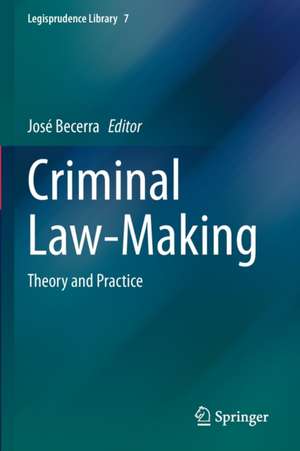Criminal Law-Making: Theory and Practice: Legisprudence Library, cartea 7
Editat de José Becerraen Limba Engleză Paperback – 31 mai 2022
This book intends to contribute to the consolidation of the new approach to lawmaking that has taken place in the last 20 years in legal philosophy and legal theory, spreading to other legal fields, especially criminal law. This new legislation science focusing on criminal problems has triggered a growing interest in the field, a dynamic which has led to a long-needed convergence of disciplines such as administrative law, criminal law, criminology, political science, sociology and, of course, legal philosophy to contribute to a more rational decision-making process for the construct of criminal laws.
With the intention to continue on with the building of a solid “Criminal Legislation Science”, this work presents scholars, lawmakers and students various emblematic approaches to enrich the discussion about different and promising tools and theoretical frameworks.
With the intention to continue on with the building of a solid “Criminal Legislation Science”, this work presents scholars, lawmakers and students various emblematic approaches to enrich the discussion about different and promising tools and theoretical frameworks.
| Toate formatele și edițiile | Preț | Express |
|---|---|---|
| Paperback (1) | 887.55 lei 6-8 săpt. | |
| Springer International Publishing – 31 mai 2022 | 887.55 lei 6-8 săpt. | |
| Hardback (1) | 1002.44 lei 6-8 săpt. | |
| Springer International Publishing – 30 mai 2021 | 1002.44 lei 6-8 săpt. |
Preț: 887.55 lei
Preț vechi: 1082.38 lei
-18% Nou
Puncte Express: 1331
Preț estimativ în valută:
169.86€ • 176.68$ • 140.22£
169.86€ • 176.68$ • 140.22£
Carte tipărită la comandă
Livrare economică 15-29 aprilie
Preluare comenzi: 021 569.72.76
Specificații
ISBN-13: 9783030713508
ISBN-10: 3030713504
Ilustrații: X, 231 p. 9 illus., 7 illus. in color.
Dimensiuni: 155 x 235 mm
Greutate: 0.35 kg
Ediția:1st ed. 2021
Editura: Springer International Publishing
Colecția Springer
Seria Legisprudence Library
Locul publicării:Cham, Switzerland
ISBN-10: 3030713504
Ilustrații: X, 231 p. 9 illus., 7 illus. in color.
Dimensiuni: 155 x 235 mm
Greutate: 0.35 kg
Ediția:1st ed. 2021
Editura: Springer International Publishing
Colecția Springer
Seria Legisprudence Library
Locul publicării:Cham, Switzerland
Cuprins
Legislative Policy in Spain. Analysis of the Current Situation and the Challenges for a Quality Legislative Technique.- Sword or Shield? The Influence of International Organisations in Counterterrorism Law and Policy Making.- EU Law-Making Process in Criminal Matters after Lisbon. In Search of a Better EU Criminal Policy.- From Lobbying to Corruption: The Strategies of Pressure Groups to Influence the Law-Making Process.- Does Public Opinion Matter for Criminal Law? Revisable Life Imprisonment in Spain and its Relationship with Social Demands.- Perpetual Prison in Colombia. Analysis of the Legislative Initiatives for their Authorization, and the «rational» Arguments for their Incorporation in the Colombian Legal System.- The Influence of the Law-and-Order Model in Spanish Juvenile Criminal Lawmaking Policy.- Instrumental Rationality of the Legislator and Social Stereotypes on Crime: Models of Punitive Argumentation.- The Victim as a Client of the Penal System.- Punitiveness and SpanishCriminal Law Making Policy. Four Homogeneous Legislative Terms (1996-2011).- Brazilian Post-1988 Constitution Criminal Policies: Comparing Lawmaking with Impacts on Incarceration
Notă biografică
Jose Becerra Muñoz is assistant professor in the Criminal Law Department and researcher at the Institute of Criminology (both at the University of Malaga, Spain). His interest in criminal legislation creation and evaluation in the last 10 years led him to co-found and coordinate two working groups on criminal law-making policy, both at Spanish and European level. His aim is to find new ways to contribute from an interdisciplinary perspective to the achievement of higher standards in criminal law-making processes, bringing together a set of disciplines able to help us to better understand the features of such processes and to search for new legislation management techniques.
Textul de pe ultima copertă
This book intends to contribute to the consolidation of the new approach to lawmaking that has taken place in the last 20 years in legal philosophy and legal theory, spreading to other legal fields, especially criminal law. This new legislation science focusing on criminal problems has triggered a growing interest in the field, a dynamic which has led to a long-needed convergence of disciplines such as administrative law, criminal law, criminology, political science, sociology and, of course, legal philosophy to contribute to a more rational decision-making process for the construct of criminal laws.
With the intention to continue on with the building of a solid “Criminal Legislation Science”, this work presents scholars, lawmakers and students various emblematic approaches to enrich the discussion about different and promising tools and theoretical frameworks.
With the intention to continue on with the building of a solid “Criminal Legislation Science”, this work presents scholars, lawmakers and students various emblematic approaches to enrich the discussion about different and promising tools and theoretical frameworks.
Caracteristici
Explores the new frontiers of rational legislation in criminal law-making Combines a theoretical-practical approach to the making of criminal law with a legal theory perspective Applies better regulation research tools to the field of criminal law









